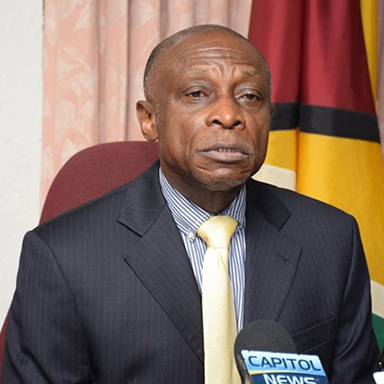More than a week after a note verbale was sent, demanding the withdrawal of untrue statements that a British military base was being built on an Essequibo River island to train Venezuelan refugees to destabilise the Nicholas Maduro government, Moscow has not retracted the claim.
“The Russian representatives were called in and firmly told that the story, as they are well aware, is untrue and we asked them to make it right; to withdraw it…I think all we have so far is an acknowledgement of the note verbale we sent them,” Foreign Secretary Carl Greenidge told Stabroek News yesterday.
Over a week ago, during a weekly press briefing that was broadcast live by Russia Today, Director of the Information and Press Department of the Russian Ministry of Foreign Affairs Maria Vladimirovna Zakharova said that “the British continue constructing a military base at the estuary of the Essequibo River.”
“They say it’s to fight the smuggling of drugs and arms,” she said, while adding that “several dozen of the so-called refugees from Venezuela have already arrived there. In fact, those are the people who have arrived to complete training for the recon and diversion groups in order to work in Venezuela and destabilise the situation and commit relevant actions from extremist to terrorist.”
Guyana’s Foreign Affairs Ministry swiftly responded, saying that the statement was “baseless” and “utterly false.”
“It is especially unfortunate given that relations between Guyana and Russia have always been based on mutual respect, trust and friendship,” it said.
Yesterday, Greenidge told Stabroek News that upon learning of the broadcast, Georgetown immediately called in the Russian representatives here and they were asked to withdraw the statement. Asked if they acquiesced, he replied, “no.”
Questioned as to the next step, Greenidge said, “These things are not as clear cut as newspapers like to have them…it is a process. We will see, we have things to do.”
“There is no standard map of what happens to diplomatic relations. If they have said something which is obviously untrue and they repeat, we continue to tell the world that it is untrue,” he added.
British High Commissioner to Guyana Greg Quinn yesterday reiterated London’s position on the matter, describing the statements made as baseless.
“Our position is clear. The claims by the Russian Foreign Ministry are clear disinformation. It is for the Russians to therefore take appropriate action in the light of that and the fact that we do not possess, are not building, and do not operate from any base in Guyana,” the British envoy told this newspaper.
Greenidge also expressed similar sentiments saying that the Russians are yet to provide an iota of evidence to support their claim.
“Guyana is an open society. If the Russians believe that there is a base in the Essequibo islands, they are at liberty to go, take a picture, show what is this base that they have seen. And of course, the newspapers are never short in trying to show that the government is saying one thing and doing another. So the newspaper themselves are at liberty, if they have found such evidence, to publish it. We don’t have concerns in that regard because it is a complete fabrication,” he said.
Greenidge further explained that persons familiar with the geographical location and proximity of the Essequibo islands to Venezuela would understand firsthand that such a claim would make no sense.
“I think Guyanese would know it is untrue, our bilaterals in the region – CARICOM and others, would know it is untrue. I suppose it is a case of muddying the waters and hoping it would serve some goal,” he said.
“I think, what one has to give some thought to [is], ‘What is the ultimate purpose of this?’” he said.
Asked about possible motives, Greenidge responded, “I am not able to say.”
But, he reasoned, “It can’t be to remove a base because there is no base to be removed and we would be rather foolish to be training Venezuelan terrorists in a country as small as this, next door to a neighbour that is so large. We would be rather foolish.”
Further, he added, “It is more likely to be the discovery of petroleum in [Guyana’s offshore territory] by the Chinese, Americans and now European companies. It probably has more to do with that than anything else but I am not able to attribute a reason.”
Guyana’s government has previously reaffirmed its unequivocal commitment to the purposes and principles of the United Nations Charter, while stating that this country has always been resolute in its advocacy for several principles of international law, including, in particular, the sovereign equality of states.
“Guyana therefore categorically rejects any suggestion that it would allow its sovereign territory to be used in a manner inconsistent with its neighbourly and peaceful relations with Venezuela,” the Ministry of Foreign Affairs had said in a statement.


